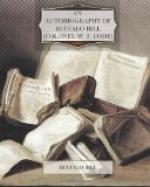“Look yere, kid,” he shouted, “ye see this knife?”
He drew a long, wicked bowie. “Well, I’m going to sharpen that to finish up the job that Charlie Dunn began the other day.” And scowling horribly at me he began whetting the knife on a stone he picked up from the table.
Now, I knew something about a gun, and there was a gun handy. It was upstairs, and I lost no time in getting it. Sitting on the stairs I cocked it and held it across my knees. I am sure that I should have shot him had he attempted to come up those stairs.
He didn’t test my shooting ability, however. He got even with me by taking my beloved pony, Prince, when he left. Mother pleaded with him to leave it, for it was the only animal we had, but she might as well have pleaded with a wildcat.
We had now been reduced to utter destitution. Our only food was what rabbits and birds I could trap and catch with the help of our faithful old dog Turk, and the sod corn which we grated into flour. Father could be of no service to us. His presence, in fact, was merely a menace. So, with the help of Brown, Jim Lane and other Free-soilers, he made his way back to Ohio and began recruiting for his Grasshopper Falls colony.
He returned to us in the spring of ’57 mortally ill. The wound inflicted by Dunn had at last fulfilled the murderer’s purpose. Father died in the little log-house, the first man to shed his blood in the fight against the extension of slavery into the Northern Territories.
I was eleven years old, and the only man of the family. I made up my mind to be a breadwinner.
At that time the Fort was full of warlike preparations. A great number of troops were being assembled to send against the Mormons. Trouble had been long expected. United States Judges and Federal officers sent to the Territory of Utah had been flouted. Some of them never dared take their seats. Those who did asked assistance. Congress at last decided to give it to them. General Harney was to command the expedition. Col. Albert Sidney Johnston, afterward killed at Shiloh, where he fought on the Confederate side, was in charge of the expedition to which the earliest trains were to be sent.
Many of the soldiers had already pushed on ahead. Russell, Majors & Waddell were awarded the contract for taking them supplies and beef cattle. The supplies were forwarded in the long trains of twenty-five wagons, of which I have told you. The cattle were driven after the soldiers, the herds often falling many miles behind them.
I watched these great preparations eagerly, and it occurred to me that I ought to have a share in them. I went to Mr. Majors, whom I always called Uncle Aleck, and asked him for a job. I told him of our situation, and that I needed it very badly for the support of my mother and family.
“But you’re only a boy, Billy,” he objected. “What can you do?”
“I can ride as well as a man,” I said. “I could drive cavayard, couldn’t I?” Driving cavayard is herding the extra cattle that follow the wagon train.




